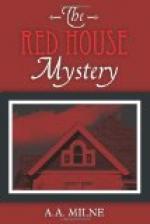“Yes, he might have, but he didn’t. Or if he did, somebody was in the room at the time, and that somebody isn’t here now. And that somebody took a revolver away with him. Well, the police will want to say a word about that, won’t they?”
Cayley was silent, looking on the ground.
“Oh, I know what you’re thinking, and believe me I do sympathize with you, but we can’t be children about it. If your cousin Mark Ablett was in the room with this”—he indicated the body—“this man, then—”
“Who said he was?” said Cayley, jerking his head up suddenly at Antony.
“You did.”
“I was in the library. Mark went in—he may have come out again —I know nothing. Somebody else may have gone in—”
“Yes, yes,” said Antony patiently, as if to a little child. “You know your cousin; I don’t. Let’s agree that he had nothing to do with it. But somebody was in the room when this man was shot, and—well, the police will have to know. Don’t you think—” He looked at the telephone. “Or would you rather I did it?”
Cayley shrugged his shoulders and went to the telephone.
“May I—er—look round a bit?” Antony nodded towards the open door.
“Oh, do. Yes.” He sat down and drew the telephone towards him. “You must make allowances for me, Mr. Gillingham. You see, I’ve known Mark for a very long time. But, of course, you’re quite right, and I’m merely being stupid.” He took off the receiver.
Let us suppose that, for the purpose of making a first acquaintance with this “office,” we are coming into it from the hall, through the door which is now locked, but which, for our special convenience, has been magically unlocked for us. As we stand just inside the door, the length of the room runs right and left; or, more accurately, to the right only, for the left-hand wall is almost within our reach. Immediately opposite to us, across the breadth of the room (some fifteen feet), is that other door, by which Cayley went out and returned a few minutes ago. In the right-hand wall, thirty feet away from us, are the French windows. Crossing the room and going out by the opposite door, we come into a passage, from which two rooms lead. The one on the right, into which Cayley went, is less than half the length of the office, a small, square room, which has evidently been used some time or other as a bedroom. The bed is no longer there, but there is a basin, with hot and cold taps, in a corner; chairs; a cupboard or two, and a chest of drawers. The window faces the same way as the French windows in the next room; but anybody looking out of the bedroom window has his view on the immediate right shut off by the outer wall of the office, which projects, by reason of its greater length, fifteen feet further into the lawn.
The room on the other side of the bedroom is a bathroom. The three rooms together, in fact, form a sort of private suite; used, perhaps, during the occupation of the previous owner, by some invalid, who could not manage the stairs, but allowed by Mark to fall into disuse, save for the living-room. At any rate, he never slept downstairs.




